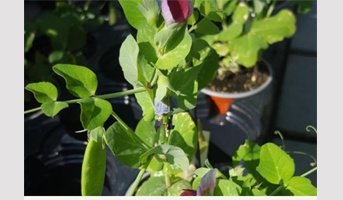Seminar Lars Østergaard
Fruit development and evolution driven by a hormonal and genetic pas de deux - Monday, January 20th 2025, 11 am
The evolution of flowering plants (angiosperms) rests on one key morphological innovation that occurred ~150M years ago with formation of the carpel and other floral organs underlying the rapid radiation of the angiosperm phylum. The phytohormone auxin plays an integral role in carpel development and morphology. While auxin signalling has been mainly attributed to a repressor degradation-based pathway, a non-canonical mechanism has been revealed in carpel development to form the gynoecium. This mechanism involves a direct auxin-induced switch in the activity of the Auxin Response Factor, ETTIN (ETT). As the ETT clade only exists in angiosperms, it remains unknown when the pathway evolved. Our work provides evidence that ETT was recruited from an ancestral role in leaf development and subsequently underwent neofunctionalisation through the acquisition of direct auxin sensing to establish gynoecium patterning.
In addition to a fundamental understanding of hormonal control of organogenesis, knowledge on organ formation holds great potential for the improvement of crops. Legumes comprise a globally important source of protein-rich and high-quality food with a vast diversity of crop types suited for highly different environments. Moreover, growth of legume crops reduces environmental impact with lower emissions of greenhouse gasses and reduced use of N fertiliser. Legume crops are therefore likely to play a major role in future cropping systems. Here, I will present how fundamental research into plant growth and development can be exploited to improve the performance of legume crops and move towards more sustainable agricultural practices.
Seminar Lars Østergaard, Molecular Signalling in Plant Development, Université d’Oxford
Invitation : Alexandre de Saint Germain, contact, "Strigolactones and Allelochemicals Signaling" SAS team
In connection with the research developed at the Institute Jean-Pierre Bourgin for Plant Sciences.
In addition to a fundamental understanding of hormonal control of organogenesis, knowledge on organ formation holds great potential for the improvement of crops. Legumes comprise a globally important source of protein-rich and high-quality food with a vast diversity of crop types suited for highly different environments. Moreover, growth of legume crops reduces environmental impact with lower emissions of greenhouse gasses and reduced use of N fertiliser. Legume crops are therefore likely to play a major role in future cropping systems. Here, I will present how fundamental research into plant growth and development can be exploited to improve the performance of legume crops and move towards more sustainable agricultural practices.
Seminar Lars Østergaard, Molecular Signalling in Plant Development, Université d’Oxford
Invitation : Alexandre de Saint Germain, contact, "Strigolactones and Allelochemicals Signaling" SAS team
In connection with the research developed at the Institute Jean-Pierre Bourgin for Plant Sciences.
Back
